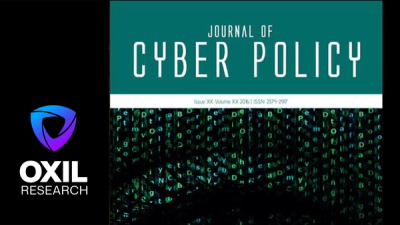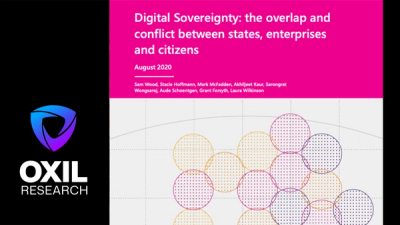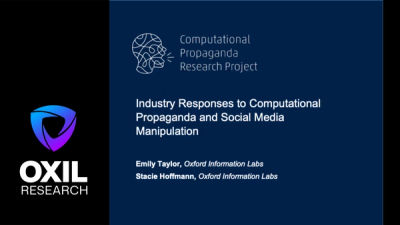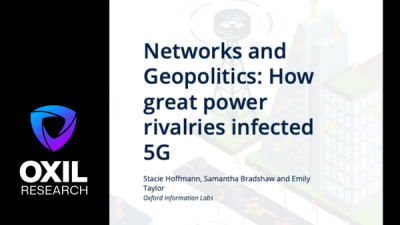
Standardising the splinternet: how China’s technical standards could fragment the internet
A paper published in the Journal of Cyber Policy discussing China's technical standards and how they may break apart the internet into a 'Splinternet'
Authors
Stacie Hoffmann

A paper published in the Journal of Cyber Policy discussing China's technical standards and how they may break apart the internet into a 'Splinternet'
Authors

This paper explores the differing interpretations of digital sovereignty among states, enterprises and citizens, and explores the implication of these differences for the future of the global internet.
Authors
The ecosystem of junk news & disinformation around COVID-19 is enabled by search engines and advertising platforms that contribute to their visibility and financial revenue. Sites that consistently publish junk news, including harmful stories relating to COVID-19, show professional SEO strategies tasked with disseminating their content through search engines. They have high levels of domain authority, meaning that their content will rank high in search results for popular keywords.
Authors

This paper provides an inventory of the self-regulatory initiatives taken by six Internet platforms in response to computational propaganda between 1 November 2016 and 31 April 2018.
Authors

This report examines the impact of algorithmic changes made by social media platforms, designed to curb the spread of disinformation, through the lens of digital marketing. The report highlights some of the techniques used by campaigners to attract, retain and persuade online audiences. It also sets out recommendations for the UK Electoral Commission.
Authors

Geopolitical power struggles, protectionist policies and national security concerns are fuelling the race to 5G. At the same time, legitimate concerns are are lost in the rhetoric of trade wars, intellectual property, and sanctions violations. As a result, new alliances and national policies are emerging, which indicate a shift for the future of peace and diplomacy.
Authors

One of a series of architecture and policy proposal documents, this paper provides an IoT security reference architecture for the healthcare industry. Based on well-known security principles and best practices, the paper develops four use cases and reference architectures to explore how to adopt security best practices in a healthcare ecosystem.
Authors

White paper exploring how existing regulations may be applied to the IoT and how they can be used to improve security in the IoT ecosystem.
Authors

One of a series of architecture and policy proposal documents, this paper provides a hub based approach to enterprise IoT security. Based on well-known security principles and best practices, the example architecture focuses on three areas of security: network management, connecting devices and lifecycle management.
Authors

One of a series of architecture and policy proposal documents, this paper provides a hub based approach to home IoT security. Based on well-known security principles and best practices, the example architecture focuses on three areas of security: network management, connecting devices and lifecycle management.
Authors

A NATO Stratcom paper provides an inventory of the self-regulatory initiatives taken by three Internet platforms between November 2016 and September 2018 in response to disinformation activities.
Authors

The Digital Freedom Fund convened a diverse set of collaborators to identify potential developments that may impact the future of digital rights.
Authors
Stacie talks with BBC Radio Oxford about the increase in COVID-related phishing and how to protect yourself.
Stacie Hoffmann interviewed by Katty Kay and Christian Fraser | SolarWinds cyberattacks following the FireEye hack.
Digital Infrastructure Minister Matt Warman tweets about Oxford Information Labs’ project with IOT Security Foundation to improve the Cybersecurity of smart devices
The Internet of Things Security Foundation collaborated with Oxil in designing infographics and quick guides for their upcoming webinar series on cybersecurity on Consumer Internet of things- including new regulations in Default Passwords, Security Software Updates and Vulnerability Disclosure policies - Graphic design by Patrick Taylor
An interview with Dominique Lazanski and Stacie Hoffman on China’s invasion of Internet standards organizations
Stacie and Dominique speak to High Tech Forum's Richard Bennett on OXIL's new paper 'Standardising the Splinternet: How China's technical standards could fragment the Internet', soon to be published by Chatham House's Journal of Cyber Policy
Stacie discussing if we can 'run out' of Internet on BBC Coventry & Warwickshire radio.
Stacie provides expert commentary to BBC Newsday on the UK’s long-awaited decision on Huawei’s role as a supplier of 5G infrastructure
Stacie provides expert commentary to Euronews Now on the UK’s long-awaited decision on Huawei’s role as a supplier of 5G infrastructure
Stacie chairs the ‘A 5G Future: Risks and Opportunities’ GovTech Summit panel, discussing 5G security with European Commissioner King, ENISA, ETNO and industry
Stacie giving a talk on DNS over HTTPS on The Hill in Washington DC at the National Symposium: Protecting Children from Online Exploitation hosted by NCOSE.
Stacie Hoffmann chairs the panel on ‘Current developments/proposals for the future of Internet Governance’ at the UK IGF 2019.